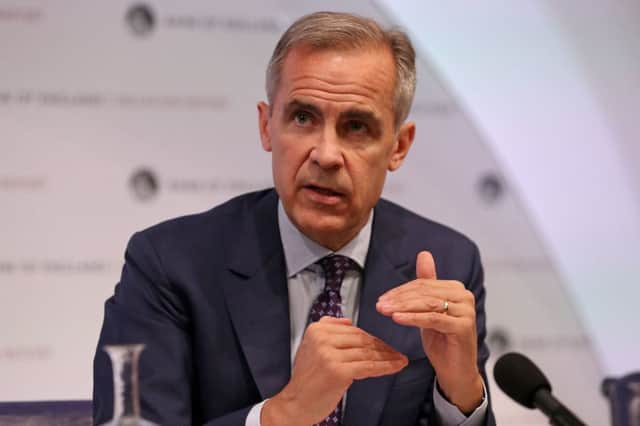Mark Casci: rate rise proves that Mark Carney should be listened to


Journalists, myself included are poised to file copy back to our newsdesk on proceedings and the atmosphere is tense.
However, there is no sport taking place and the ground itself is empty.
Advertisement
Hide AdAdvertisement
Hide AdInstead myself and the audience are waiting to see what Charles Bean, the then chief economist of the Bank of England is going to say about interest rates.
The month before they had risen to 5.25 per cent having gradually nudged upwards from a low point of 3.5 per cent in summer 2003 and the business market was concerned to see where they would head next.
Mr Bean gave a speech and said that it was the avowed hope that the rate would hopefully reduce in the coming months if the economic outlook made the Monetary Policy Committee inclined to do so.
Ultimately, the rate would nudge up to 5.75 per cent in the coming months before the beginnings of the financial crisis and the ensuing armageddon sent it plummeting down to the then unthinkable low of 0.5 per cent where it would remain for seven years.
Advertisement
Hide AdAdvertisement
Hide AdFor many people, particularly the young, these extremely low costs of borrowing have become a day-to-day reality.
Therefore when the long-expected rise in interests rates finally landed last week it was given vast amounts of coverage, with the obligatory broadcast media coverage of what it will mean for the average consumer’s mortgage payments etc.
The market had long-priced in the rise and Mark Carney took to the airwaves to point out that a tightening of monetary policy was “appropriate” given the growth in wages and decline in external price pressures. The move was met with a mixed reaction from the business community, with Tom Stevenson, investment director for personal investing at Fidelity International, calling it a “needless risk to the economy”.
It is natural for businesses to view rises in the cost of borrowing with little regard. However, it is entirely arguable that several months before the late March deadline for the UK and EU to agree a deal over Brexit, gives the Bank of England a decent amount of room to manoeuvre should there be any economic shocks either in the run-up to or following the cut-off point.
Advertisement
Hide AdAdvertisement
Hide AdWithin 48 hours Mr Carney was on the airwaves talking about the “highly undesirable” prospect of a ‘No Deal Brexit’ and made a considered call to politicians of all shape to avoid it all costs.
Predictably, within minutes the old band was back together playing its Greatest Hits.
Jacob Rees-Mogg broke out the “project fear” slur while the risible Iain Duncan Smith opined that No Deal “doesn’t exist as Britain would revert to World Trade Organisation rules if it was unable to reach a deal (bizarrely there was no criticism of Liam Fox when he described No Deal as being “odds on” at the weekend).
Let’s be clear, WTO rules are no safety net. Tariffs on cars alone would be 10 per cent. For some agricultural products they could be as high as 40 per cent.
Advertisement
Hide AdAdvertisement
Hide AdIf there is no deal whatsoever planes would be unable to fly in and out of the EU and access to potentially life-saving medicines would halt.
Meanwhile, Prime Minister Theresa May and much of the Cabinet are cancelling their holidays and hitting the European capitals on a charm offence. They know the risk of no deal and the duty they have to deliver the will of the British people without crashing the economy into ruinous anarchy.
I have long-argued Mr Carney has provided excellent stewardship of the central bank, displaying judicious oversight.
Giving the UK some flexibility with a rate rise and warning over the dangers of driving over a cliff edge all form part of this.
Advertisement
Hide AdAdvertisement
Hide AdHe is operating in a far more turbulent landscape than Mr Bean was in 2007.
The more we listen to him and the likes of Carolyn Fairburn from the CBI, voices of sensible moderation on what the nation needs, the greater the likelihood we have of securing a deal that delivers for Britain.